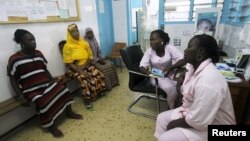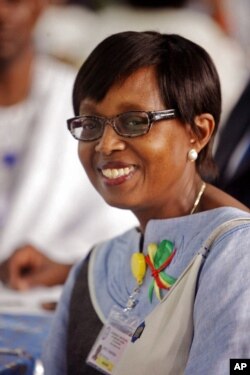The World Health Organization (WHO) is calling on African countries to invest more in strengthening their health systems. WHO Director for the Africa region, Dr. Matshidiso Moeti says the 2015 Global Strategy for Women’s, Children’s and Adolescents’ Health currently receiving additional inputs from stakeholders, will go a long way in helping countries deal with communicable diseases and epidemics affecting millions of people.
Speaking to journalists after the conclusion of the Africa regional consultation seminar in Johannesburg, Dr. Moeti said the 2015 global strategy has put the building of strong health systems at the center of delivering quality health for all by 2030.
The draft strategy calls for more funding towards improving health care services for women, children and adolescents. It advocates for quality health programs targeting marginalized rural and peri-urban areas.
And Dr. Moeti says building strong health systems is key in solving health challenges faced by many African countries.
“If we put in place very strong health systems, then you don’t need to have an infrastructure for HIV on its own and something separate for maternal mortality reduction on its own. If you do invest effectively in a good health system, I think we will be able to do better with limited resources,” she said.
She added that the input from this consultation will ensure that the global strategy provides short and long term solutions to health challenges in the continent.
Dr. Moeti, however, noted that a number of countries, including Ghana and Rwanda, were already taking steps to tackle inequality by introducing national health insurance schemes. She also praised South Africa for taking a clear and fruitful policy direction in matters of health.
“If you look at the indicators for South Africa compared to other countries in the region, in many cases South Africa is doing relatively well, which even for the previously underprivileged groups if you compare it to many other countries, its direction and certainly some of the progress that has been made its relatively better,” she said.
And Robin Gorna, director for The Partnership for Maternal, Newborn and Child Health, says the 2015 Global Strategy will become a useful guide for many countries still struggling with maternal deaths due to a variety of issues.
“The future is bright if we can get the right global strategy. The goals of this global strategy are survive, thrive and transform," said Gorna. "What we want to see is an end to all preventable deaths by 2030. If we get this right we will have no more child deaths. We will have no more stillbirths. We will have no more maternal deaths. All of those that could be avoided will be avoided.”
Six-point-three million children under the age of five died in Africa in 2013, with pneumonia, diarrhea and malaria topping the list of the causes of the deaths.
Dr. Moeti, who was assigned to head the WHO Africa region at the beginning of this year, says her immediate task is to ensure that African countries allocate sufficient health resources and skilled personnel in a way that will save lives.

